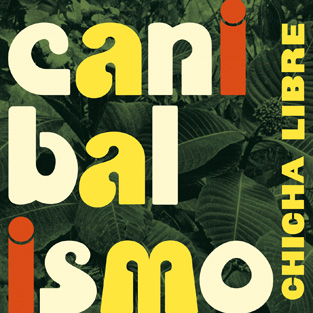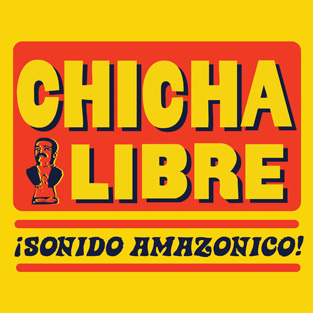
OUT NOW!
"Only Cannibalism unites us. Socially. Economically. Philosophically. The unique law of the world."
—Brazilian poet Oswald de Andrade
From gritty backwaters and backrooms, from retro equipment and deceptive nostalgia, the multi-national mixing pot of Brooklyn, NY's CHICHA LIBRE (featuring members of Si Sé and Combustible Edison) returns with Canibalismo, an expression of the edgy craving that is fueling a pop rethink around South America and causing a stir in the rock-tired indie scene.
This album of originals, while tackling obscure mathematics and psychedelic inventors, takes its cues from Peruvian chicha, a style that put surf guitar, rainforest psychedelics and Andean flavor to a cumbia beat with open-minded exuberance. CHICHA LIBRE has learned from and teamed up with the unsung mad geniuses of the music—such as Ranil and Los Shapis, who were featured on Roots of Chicha— then taken it as a springboard to join the international stream of tropical experimenters from Colombia to Argentina.
When the French-born, New York-based Olivier Conan went to the curious city of Iquitos, Peru to make a film about the town's most eccentric musician (and former mayoral candidate), he imagined himself digging through old crates in his spare time, hunting down lost chicha records, the radically omnivorous vintage music movement of the Peruvian hinterlands. He asked around, and a new friend insisted he check out his collection. There, he said, was a prime slice of chicha.That crucial album turned out to be CHICHA LIBRE's debut, Sonido Amazonico. Group instigator and cuatro player Conan found his outfit to be part of a continuation of the tropical movement that started with early 20th-century avant-garde South American artists, and continues to inspire young wild musicians in Latin America. "Young Latin bands today, like chicha's stars and like early rock innovators, cannibalize everything around them. They aren't slaves to codes."
Like the legends of 60s and 70s rock sucked up and radically transformed the blues and jazz, today's tropicalists are reshaping cumbia's sound to suit their own unabashed, unconventional tastes. For CHICHA LIBRE, this means vintage rock sounds rumble past irrepressible bursts of percussion, the Valkyries cavort to mellotrons, pan-Latin beats merge with curious lyrics, and the occasional passerby joins in with Guinean guitar or pedal steel riffs.
The band's brash creativity has jumped forward, as they leave musical reconstructions behind and gnaw the roots of everything from indie rock to European art music, merrily sending timbales through old guitar amps, inventing their own Tupperware-contained synths, and tossing everything into the tape delay machine.
On Canibalismo, CHICHA LIBRE spits out a raucous cumbia rendition of Wagner complete with dubbed-out grooves, moseying surf guitar, and eerily quirky keys ("Ride of the Valkyries"). They reflect seriously on the delusion of the vintage and the nature of nostalgia for the good ol' days ("L'Age d'Or"), while laying on the retro sound thanks to the copious use of old analog equipment. They sway through lush, trippy cumbias ("La Danza del Milionario"). Then they go off the deep end with a funked-up, Latin-edged tribute to 19th-century math genius Carl Friedrich Gauss & Fermat primes ("Number Seventeen"); or with a slow-burning homage to the inventor of a certain popular psychedelic drug. ("Lupita en la Selva y el Doctor").








